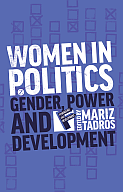Women in Politics:
Gender, Power and Development
Mariz Tadros (ed.)
Book Review
 This, for me, surprisingly optimistic book traces the experiences and realities of a diverse range of women active in formal political systems in Africa (Egypt, Ghana, Sudan and Sierra Leone), Asia (Bangladesh and India) and in the Occupied Palestinian Territories (OPT) and Brazil. The stories and observations collected – using a life-history approach – in this very readable collection, demonstrate not just creativity, innovation and independence on a personal scale, but also to a desire to change and improve accountability and governance systems in very different political contexts.
This, for me, surprisingly optimistic book traces the experiences and realities of a diverse range of women active in formal political systems in Africa (Egypt, Ghana, Sudan and Sierra Leone), Asia (Bangladesh and India) and in the Occupied Palestinian Territories (OPT) and Brazil. The stories and observations collected – using a life-history approach – in this very readable collection, demonstrate not just creativity, innovation and independence on a personal scale, but also to a desire to change and improve accountability and governance systems in very different political contexts.
My optimism derives from the examples the book provides us with of women who are engaged in established party politics, but who are trying to change the political system from within, motivated by a strong sense of representing the interests of their constituencies, and coming to this through their own grassroots connections. Women in this book have entered politics through the party youth stream, or through their own professional work in the community (as nurses, teachers, social or union activists, for example) or through political participation at local government level (as in the case studies from Ghana and Bangladesh), as well as through positions in religious organisations. While these entry points may not differ from those of many men, one has the sense that the women in this book have determined to enter politics out of a strong desire to champion a particular cause, rather than to simply pursue a political career. The case studies suggest that the level of women’s political bargaining power is directly linked to the base of support from their own constituency, ‘What became abundantly clear for winning an election continues to be predominantly that of service provision’ (p. 122).
If politics is essentially about working across different spheres of influence, then the various spaces that women occupy comprise the full complexity of these spheres. Women in politics must straddle the private (domestic) with the public, the formal with the informal, and the party with the non-party, and needless to say, these binaries are all gendered. While many of the women interviewed only recognised the formal aspects of their political involvement (see, for example Chapter 2 and the experience of women councilors in Bangladesh), one of the key conclusions of the book is the importance of women’s informal political engagement (p. 31, 32).
As the book points out, at an international level, women’s political empowerment has tended to be equated with the percentage of women in political office (p. 6), and quota systems designed to increase female representation are in use in many countries, including those in the case studies presented here, with the exception of Sierra Leone. However, as we can see from the experiences in the book, correlating political empowerment with the number of women holding political office ignores the obvious drawbacks inherent in the use of quotas. The sheer size of relatively newlyimplemented quotas can lead, in the absence of adequate numbers of potential female candidates to established parties simply using the quota system as a means of multiplying their seats in parliament, something recognised by a female politican in Sudan, ‘The quota women are brought to power by the parties’ technical committees, not by votes. So that’s where they get their instructions’ (p. 28).
While male resistance to women’s political presence and priorities continues to be strong (the use of women as political proxies notwithstanding – see for, example, Chapter 6’s case study on India) the case studies reveal a good number of women with families entering the political arena with a supportive social network, including immediate family, spouses and children. In fact, in several instances, family is a major asset for women entering politics (pp. 83, 86, 95). In response to societal resistance, women need to be especially thick-skinned and resilient to commit to life in politics, from gaining a foothold, all the way through to working the political system.
Women entering politics enter a male domain, and many do so while maintaining their self-perceptions of their roles in society and what they are capable of doing. In Egypt, for instance, women provide emotional, spiritual and welfare assistance to thousands of families (pp. 121-122), something regarded, by the female Salafist interviewee in this case study as befitting a woman’s ‘weaker’ role, as driven by ‘nature’. This interviewee also regarded her place at the bottom of the party’s candidacy list as appropriate, given these ‘natural’ differences between men and women (p. 121), thus reinforcing the gendered hierarchy within the highly religious, Salafi movement, and the monopoly by men of leadership positions in politics more generally.
Although the stories detailed in Women in Politics come from the lived realities of women in challenging national political climates, they speak to all women involved in politics around the world, in developed, developing and emerging economies alike. The book offers valuable, grounded insights into the experiences of women engaging in formal politics, and derived from these insights, possible policy interventions for increasing women’s political representation. As such, it will be of interest to new generations of politicians, both women and men,, to students of political economy and all those concerned with issues of gender, politics and power.
© 2015, Nidhi Tandon, Consultant and Trainer, Canada
Women in Politics: Gender, Power and Development is published by Zed Books
Review originally published in Gender & Development 23.2 (2015)
